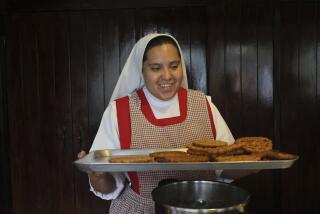Monks Plan to Be Brothers’ Eternal Keeper
- Share via
Stepping out of their usually reclusive lifestyle, Trappist monks at an Iowa abbey plan to sell their handcrafted wooden caskets to the public for the first time since the retreat was founded in 1849.
Trappist Caskets, a venture launched a year and a half ago to offset New Melleray Abbey’s dwindling farm profits, has sold only to funeral homes and distributors but has always made caskets for its own members.
The monks, who remain silent for at least half the day as part of a vow of obedience, wanted to have a better sense of serving the community, said Sam Mulgrew, general manager of Trappist Caskets.
“They felt they were out of touch with their clientele,” Mulgrew said in an interview from Dubuque, Iowa.
Trappists belong to the Cistercian tradition, which follows the Rule of St. Benedict and calls for a life of manual labor and contemplative prayer.
True to the monks’ vows of austerity, the Trappist caskets are simple handcrafted models made of oak, walnut, ash or pine found in the abbey’s large forest. The monks produce about 300 a year and sell them for prices ranging from $550 to $1,385. “The simplicity, workmanship and affordability of our caskets make them attractive to most people,” Mulgrew said.
Mulgrew, the enterprise’s only employee, manages the business and marketing side of Trappist Caskets while the 36 monks craft the products. The monks also occasionally will talk about the caskets with potential customers at the abbey’s new showroom, he said.
Moving into the casket business, the Trappist brothers have tapped into a lucrative market.
Death-care experts estimate that Americans purchase 2 million funerals every year; U.S. funeral firms perform 5,500 services a day. The average price for a casket is about $2,176, according to a survey by the National Funeral Directors Assn.
As consumers become more savvy, they are also moving away from traditional plans and personalizing funeral arrangements, said Bob Fells, a spokesman for another trade group, the International Cemetery and Funeral Assn.
“What we’re seeing is the baby boomers are now getting a lot of experience with funerals [by] burying their parents, and they’re coming away with certain insights,” Fells said.
“People don’t want a cookie-cutter funeral; they want something personal.”
More to Read
Inside the business of entertainment
The Wide Shot brings you news, analysis and insights on everything from streaming wars to production — and what it all means for the future.
You may occasionally receive promotional content from the Los Angeles Times.










